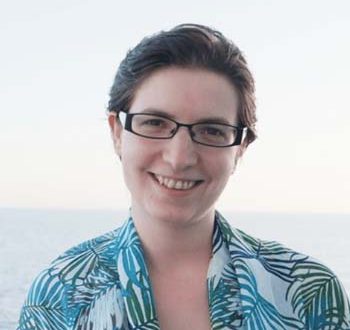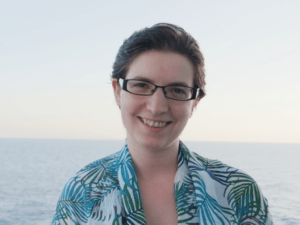This week we profile Zeeko presenter Kirsty Park. Kirsty is an Irish Research Council funded PhD researcher in Communications at DCU. She has worked as a lecturer and taught coding workshops for Transition Year students. We talk to Kirsty about her role with Zeeko visiting schools throughout the country to help keep kids safe online!
What made you want to work in the area of internet safety for young people?
I spent too much time online as a teenager and it took me a long time to learn about balance and using the internet responsibly. It’s even harder for kids now, as technology has advanced so fast. I love being able to help young people question and learn about using the internet well, as it can have a big impact on their lives.
What do you enjoy most about your job?
There’s nothing better than knowing you helped someone, whether it’s an overwhelmed parent or a confused child. It’s always a great feeling when you can see that the information we are giving is helping someone deal with a specific situation in their own life.
What one positive anecdote can you share about your time working in schools?
At a primary school I was in recently, a 6th class girl talked about how when she first got her phone she spent all her time on it, but she eventually realised it didn’t leave her feeling good and so she started setting herself time limits. It’s that kind of critical self-awareness that we all need to get the benefits of the internet!
What one negative anecdote can you share from your experience of working in schools?
There’s been a number of times young people have brought up specific issues like strangers messaging them or instances of cyberbullying and when asked if they got help from an adult they say no.
Is there a school you have visited that took a particularly positive stance on internet safety? Tell us about that.
The best approach is to keep internet safety an active topic in the classroom. I’ve definitely noticed that when I see posters or student work around internet safety in the hallways or in a classroom I then notice a difference in the responses and maturity from the young people themselves.
In the course of your work with Zeeko have you learned any particularly good tip(s) from a parent about how they manage internet safety with their child?
The biggest tip I’ve heard from parents is to make all the bedrooms in your house screen free. It fixes a lot of problems around screentime and inappropriate content and if you can make it a rule when kids are younger then they will just see it as normal when they get older. Also it has to apply to everyone to set the example, even the adults!
What has surprised you most in your role with Zeeko?
How much young people have to contend with online. Whether it’s young kids getting anxious at things they see or teens trying to deal with pressures around social media and fitting in, young people need help to develop healthy digital habits in many areas.
If you could offer one piece of advice to parents about kids and the online world what would that be?
Regularly communicate with your child about the internet. Ask them what they like to do or what their opinions are about things online or watch the YouTubers they like. I’ve noticed a lot of parents can feel overwhelmed because they feel like they don’t know much about technology and their kids know a lot, but the truth is young people need the maturity and insight from adults. Take an interest in their online world and you will have the understanding and relationship you need to help guide them when they need it.
Do you have a light-hearted story you would like to share from your experience of working as a presenter with Zeeko?
I was talking to a class about how different companies collect our information online and use it to sell adverts. A 4th class boy stopped me later in the workshop, went back to that topic and said, “So if a company like Google makes loads of money from all our information, then why don’t they pay their taxes?”. Potential accountant in the making there.
What do you find most challenging about your job?
It can be a very long day presenting from the early morning and sometimes only finishing late in the evening, but it is great that we can deliver content for so many different needs and audiences over the course of a day.


